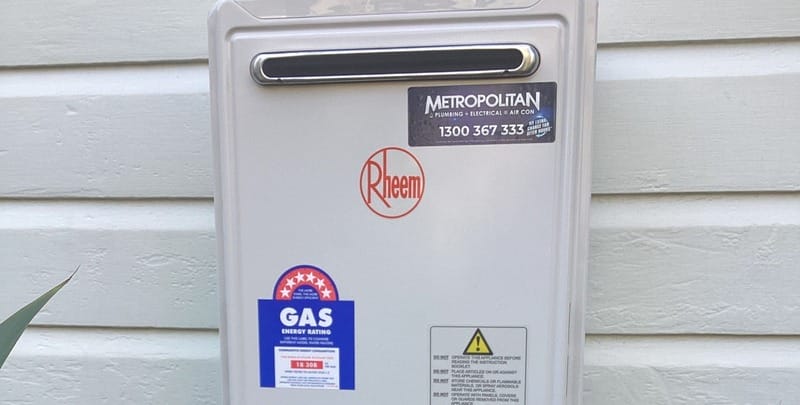
The Pros and Cons of an Instant Hot Water System
Are you tired of waiting for your shower to heat up or constantly running out of hot water during peak usage times? If so, you’ve probably considered investing in an instant hot water system.
These systems (aka continuous flow or tankless hot water systems) promise to provide hot water on demand, eliminating the frustrating delays and ensuring a steady supply of warmth whenever you need it. But before you rush into a decision, it’s important to weigh the pros and cons carefully.
In this blog, we’ll delve into the pros and cons of an instant hot water system. From the convenience of instant hot water to the potential drawbacks like installation costs and maintenance requirements, we’ll cover it all.
Whether you’re a homeowner looking to upgrade your water heating system or a renter curious about your options, understanding the ins and outs of instant hot water systems is essential. So, grab a cup of tea or coffee (perhaps made with instant hot water), and let’s explore whether this innovation is the right fit for your needs.
Pros of an Instant Hot Water System
Let’s start with the upside of opting for an instantaneous hot water system:
- Instantaneous hot water supply: Say goodbye to waiting for your shower to warm up. With an instant hot water system, you’ll have hot water on demand, eliminating frustrating delays and ensuring a continuous supply of warmth whenever you need it.
- Energy efficiency: Instant hot water systems are known for their energy efficiency compared to storing water in a hot water tank. By heating water only when needed, these systems help reduce energy consumption and lower utility bills, making them a cost-effective and eco-friendly option for many homeowners.
- Space saving: Unlike traditional water heaters that use a storage tank, instant hot water systems often come in compact designs, saving valuable space in your home. Whether you’re dealing with a small apartment or a crowded utility room, these space-saving features can make installation a breeze.
- Reduced water waste: With an instant hot water system, there’s less water wasted during the heating process. Unlike traditional water heaters that store and heat water continuously, instant systems heat water on demand, minimising water waste and contributing to a more sustainable lifestyle.
- Eco-friendly: Instantaneous hot water systems are better for the environment. Continuous flow systems have fewer greenhouse gas emissions, particularly compared to electric storage hot water systems.
These benefits make instant hot water systems a popular choice for homeowners looking to upgrade their water heating systems and enjoy the convenience and efficiency of hot water whenever they need it.

Cons of an Instant Hot Water System
What’s the downside of an instantaneous hot water system? Let’s take a closer look:
- Initial cost: One of the main drawbacks of instant hot water systems is the higher initial cost compared to traditional water heaters. The upfront investment for purchasing and installing these systems can be significant, which may deter some homeowners from making the switch.
- Potential energy loss: While instant hot water systems are generally energy efficient, they can still experience energy loss, particularly through standby energy consumption and heat loss in pipes. This could result in slightly higher energy bills over time.
- Limited hot water output: Instant hot water systems may struggle to meet the hot water demands of larger households or during times of peak usage. Their limited capacity compared to storage hot water systems can lead to situations where multiple users are unable to access hot water simultaneously, causing inconvenience.
- Maintenance requirements: Like any appliance, instantaneous hot water systems require regular maintenance to ensure optimal performance. This may include flushing the system, checking for leaks, and servicing components. The complexity of repairs and the need for professional assistance can also add to maintenance costs over time.
While these drawbacks are important to consider, many homeowners find that the benefits of an instantaneous hot water system outweigh the potential drawbacks, especially in terms of convenience and energy efficiency.
Tankless Hot Water: Gas vs Electric
When it comes to choosing an instant hot water system, one of the key decisions you’ll face is whether to go with a natural gas-powered or electric model. Each option comes with its own set of advantages and considerations, making it important to weigh your options carefully.
Gas-powered instant hot water systems are known for their fast-heating capabilities and typically have lower operating costs compared to electric models. They rely on natural gas or LPG (liquefied petroleum gas) to quickly heat water as it passes through the system, ensuring a steady supply of hot water whenever you need it. However, a gas system will often require venting to expel combustion gases, which can add complexity to installation and maintenance.
On the other hand, electric instant hot water systems are easier to install and don’t require venting, making them a more straightforward option for many homeowners. While electric hot water systems may have slightly higher operating costs compared to gas models, an electric tankless water heater can often be more energy efficient in the long run, especially in areas where electricity is cheaper or more readily available.
Ultimately, the choice between gas and electric instant hot water systems will depend on factors such as your home’s utility setup, budget and preferences.
There are other methods to consider, such as heat pump hot water, so it could be worth consulting with a professional to determine which option best suits your needs and lifestyle.

How to Choose an Instant Hot Water System
There are several key factors to keep in mind when choosing an instantaneous hot water system for your home.Firstly, consider your household size and usage patterns. Larger families or homes with high hot water demands may require a storage hot water system, which has a higher capacity to ensure everyone gets enough hot water when they need it.
Budget is another important consideration. While instantaneous hot water systems can save money in the long run through energy efficiency, they often come with a higher initial cost compared to traditional water heaters. Take the time to assess your budget and determine what you can afford upfront as well as in terms of ongoing operating costs.
Energy efficiency ratings should also be on your radar. Look for systems with high energy efficiency ratings to minimise utility bills and reduce your environmental impact. Additionally, evaluate the available space for installation. Instant hot water systems come in various sizes and designs, so make sure you have enough space and access to utilities for proper installation.
Finally, don’t forget about maintenance and service requirements. Consider the long-term upkeep of the system and factor in any potential maintenance costs or service agreements.
By carefully considering these factors, you can make an informed decision and choose the instantaneous hot water system that best meets your needs and fits within your lifestyle and budget.
Making the Right Choice
The decision to invest in an instantaneous hot water system involves weighing the pros and cons to determine what best suits your household’s needs. On the positive side, these systems offer instant hot water supply, energy efficiency, space-saving designs, and reduced water waste.
However, there are also drawbacks to consider, such as the initial cost, potential energy loss, limited hot water output and maintenance requirements.
Despite these considerations, it’s important to remember that every home is unique, and what works for one household may not work for another.
When making your decision, take into account factors like household size, usage patterns, budget, and space availability. By carefully evaluating these factors and weighing the pros and cons, you can make an informed choice that aligns with your priorities and preferences.
Whether you prioritise convenience, energy efficiency, or affordability, there’s likely an instant hot water system that meets your needs.
By considering individual circumstances and preferences, you can find a solution that ensures a steady supply of hot water while minimising energy consumption and maximising convenience. So, take your time, do your research, and choose the option that’s right for you.
Please note: This information is provided for advice purposes only. Regulations differ from state to state, so please consult your local authorities or an industry professional before proceeding with any work. See our Terms & Conditions here.
Published: 19 Mar, 2024